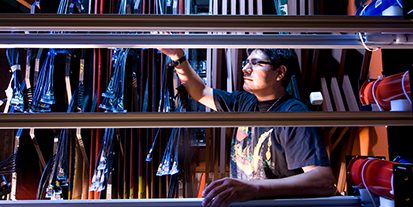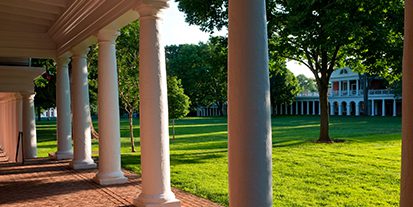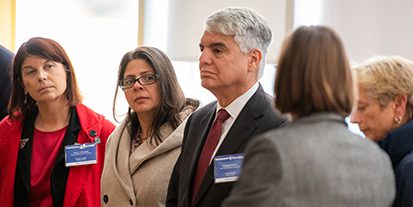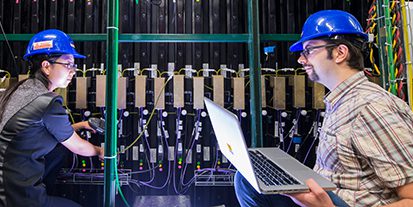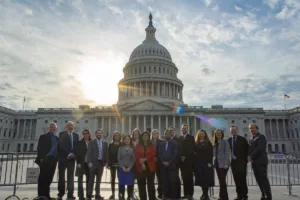The Tollestrup Award Recipients
The Tollestrup Award Recipients
 The 2021 Alvin Tollestrup award for Outstanding Postdoctoral Research is awarded to Saskia Charity, Postdoctoral researcher at Fermi National Accelerator Laboratory for widespread and essential contributions to the Muon g-2 experiment including construction and commissioning of the tracking detector and analysis of the magnetic field and precession frequency.
The 2021 Alvin Tollestrup award for Outstanding Postdoctoral Research is awarded to Saskia Charity, Postdoctoral researcher at Fermi National Accelerator Laboratory for widespread and essential contributions to the Muon g-2 experiment including construction and commissioning of the tracking detector and analysis of the magnetic field and precession frequency.
 The 2020 Alvin Tollestrup award for Outstanding Postdoctoral Research is awarded to Adi Ashkenazi, Postdoctoral researcher at the Massachusetts Institute of Technology for substantial improvements to the modeling of neutrino interactions using electron scattering data and widespread contributions to data acquisition, background modeling, and systematics on MicroBooNE.
The 2020 Alvin Tollestrup award for Outstanding Postdoctoral Research is awarded to Adi Ashkenazi, Postdoctoral researcher at the Massachusetts Institute of Technology for substantial improvements to the modeling of neutrino interactions using electron scattering data and widespread contributions to data acquisition, background modeling, and systematics on MicroBooNE.
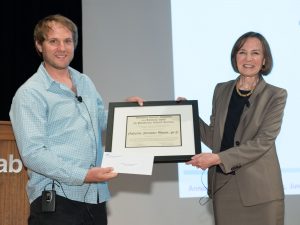 The 2019 Alvin Tollestrup award for Outstanding Postdoctoral Research is awarded to Guillermo Fernandez Moroni, Postdoctoral researcher at Fermi National Laboratory for improving the scientific reach of the SENSEI experiment by three orders of magnitude, achieving the best sensitivity in the world for electron-recoil dark matter searches and for the development of a new, low cost, scaleable, readout system that will improve the reach of future generations of experiments.
The 2019 Alvin Tollestrup award for Outstanding Postdoctoral Research is awarded to Guillermo Fernandez Moroni, Postdoctoral researcher at Fermi National Laboratory for improving the scientific reach of the SENSEI experiment by three orders of magnitude, achieving the best sensitivity in the world for electron-recoil dark matter searches and for the development of a new, low cost, scaleable, readout system that will improve the reach of future generations of experiments.
 The 2018 Alvin Tollestrup award for Outstanding Postdoctoral Research is awarded to Richard Bonventre, Postdoctoral researcher at Lawrence Berkeley National Laboratory for his creative and resourceful contributions to the MU2e tracker commissioning and simulation. His work has consistently pushed the envelope of what can reasonably be expected of prototype detectors.
The 2018 Alvin Tollestrup award for Outstanding Postdoctoral Research is awarded to Richard Bonventre, Postdoctoral researcher at Lawrence Berkeley National Laboratory for his creative and resourceful contributions to the MU2e tracker commissioning and simulation. His work has consistently pushed the envelope of what can reasonably be expected of prototype detectors.
 The 2017 Alvin Tollestrup award for Outstanding Postdoctoral Research is awarded to Nhan V. Tran of Fermilab for his novel approaches and creative leadership within the CMS experiment. His contributions include the development of new tools for pile-up mitigation and jet substructure reconstruction.
The 2017 Alvin Tollestrup award for Outstanding Postdoctoral Research is awarded to Nhan V. Tran of Fermilab for his novel approaches and creative leadership within the CMS experiment. His contributions include the development of new tools for pile-up mitigation and jet substructure reconstruction.
 The 2016 Alvin Tollestrup award for Outstanding Postdoctoral Research is awarded to Alex Drlica-Wagner of Fermilab for his technical and scientific leadership within the Dark Energy Survey experiment. His contributions include a new analysis that led to the discovery of new dwarf galaxy satellites of the Milky Way and stronger constraints on the properties of dark matter.
The 2016 Alvin Tollestrup award for Outstanding Postdoctoral Research is awarded to Alex Drlica-Wagner of Fermilab for his technical and scientific leadership within the Dark Energy Survey experiment. His contributions include a new analysis that led to the discovery of new dwarf galaxy satellites of the Milky Way and stronger constraints on the properties of dark matter.
 The 2014 Alvin Tollestrup award for Outstanding Postdoctoral Research is awarded to Marcelle Soares-Santos of Fermilab for her contributions to the Dark Energy Survey, which span from instrument construction and commissioning to high-level physics analysis.
The 2014 Alvin Tollestrup award for Outstanding Postdoctoral Research is awarded to Marcelle Soares-Santos of Fermilab for her contributions to the Dark Energy Survey, which span from instrument construction and commissioning to high-level physics analysis.
 The 2012 Alvin Tollestrup Award for Postdoctoral Research Excellence is given to Bodhitha Jayatilaka of Duke University for his leadership and significant contributions to the measurement of the W mass with the CDF experiment, bringing his Tevatron legacy measurement to an unprecedented level of precision.
The 2012 Alvin Tollestrup Award for Postdoctoral Research Excellence is given to Bodhitha Jayatilaka of Duke University for his leadership and significant contributions to the measurement of the W mass with the CDF experiment, bringing his Tevatron legacy measurement to an unprecedented level of precision. The 2011 Alvin Tollestrup Award for Postdoctoral Research Excellence is given to Thomas Schwarz of the University of California, Davis, for his outstanding work on the understanding of top quark pair production at the Tevatron, on the measurement of top quark properties, such as the forward-backward asymmetry, and on the search for new physics signatures through the top signature.
The 2011 Alvin Tollestrup Award for Postdoctoral Research Excellence is given to Thomas Schwarz of the University of California, Davis, for his outstanding work on the understanding of top quark pair production at the Tevatron, on the measurement of top quark properties, such as the forward-backward asymmetry, and on the search for new physics signatures through the top signature. The 2010 Alvin Tollestrup award for Outstanding Postdoctoral Research will be awarded to Justin Evans of University College London for his work on the measurement of the muon neutrino and anti-neutrino oscillation parameters with the MINOS experiment. Dr. Evans made significant contributions to the measurement of the muon neutrino mass-squared splitting at the atmospheric scale and to the first direct measurements of the muon anti-neutrino oscillations parameters. Dr. Evans is recognized as an expert and a leader in the experimental analysis and comparison of the neutrino and anti-neutrino oscillation parameters.
The 2010 Alvin Tollestrup award for Outstanding Postdoctoral Research will be awarded to Justin Evans of University College London for his work on the measurement of the muon neutrino and anti-neutrino oscillation parameters with the MINOS experiment. Dr. Evans made significant contributions to the measurement of the muon neutrino mass-squared splitting at the atmospheric scale and to the first direct measurements of the muon anti-neutrino oscillations parameters. Dr. Evans is recognized as an expert and a leader in the experimental analysis and comparison of the neutrino and anti-neutrino oscillation parameters. Junjie Zhu of Stony Brook University received the 2009 award for the his contributions to the DZero experiment’s measurement of the W boson mass. Zhu understood the detector’s ability, wrote interface code so experimentalists and theorists could understand each other’s analyses, wrote prediction software and participated in writing the result paper.
Junjie Zhu of Stony Brook University received the 2009 award for the his contributions to the DZero experiment’s measurement of the W boson mass. Zhu understood the detector’s ability, wrote interface code so experimentalists and theorists could understand each other’s analyses, wrote prediction software and participated in writing the result paper. Ben Kilminster of Ohio State University received the 2008 award for his contributions to the Higgs search. He worked to improve the sensitivity of CDF and the Tevatron experiments for the Standard Model Higgs by reducing the rate at which the data collection system triggered on background events in the CDF detector. He played major roles in two key search modes for the Higgs, and helped create new techniques for extracting the Higgs signal from background events.
Ben Kilminster of Ohio State University received the 2008 award for his contributions to the Higgs search. He worked to improve the sensitivity of CDF and the Tevatron experiments for the Standard Model Higgs by reducing the rate at which the data collection system triggered on background events in the CDF detector. He played major roles in two key search modes for the Higgs, and helped create new techniques for extracting the Higgs signal from background events. Yann Coadou of Simon Fraser University received the 2007 award for his work on the single top analysis at DZero.
Yann Coadou of Simon Fraser University received the 2007 award for his work on the single top analysis at DZero. Guillelmo Gomez Ceballos of the University of Cantabria developed new analytic methods to separate Bs meson decays from other B meson decays, thereby squeezing more information out of the same sets of data.
Guillelmo Gomez Ceballos of the University of Cantabria developed new analytic methods to separate Bs meson decays from other B meson decays, thereby squeezing more information out of the same sets of data. Ivan Furic of the University of Chicago made an electronics board that allowed the triggering system to recognize and record the coveted hadronic Bs meson decays.
Ivan Furic of the University of Chicago made an electronics board that allowed the triggering system to recognize and record the coveted hadronic Bs meson decays. Stephanie Menzemer of Universität Heidelberg, by determining the charge of kaons produced along with the strange quark-containing mesons, Menzemer could tell whether an oscillating Bs-Bs(bar) meson began as matter or antimatter.
Stephanie Menzemer of Universität Heidelberg, by determining the charge of kaons produced along with the strange quark-containing mesons, Menzemer could tell whether an oscillating Bs-Bs(bar) meson began as matter or antimatter. Reinhard Schwienhorst of Michigan State University received the 2005 award for his work in the development of novel multivariate techniques in the search for single top quark production. This technique effectively discriminates between the signal and backgrounds such as W+jets and top-antitop, and results in a factor of two improvement in sensitivity for this search. A single top signal should be attainable in Run 2 at the Tevatron.
Reinhard Schwienhorst of Michigan State University received the 2005 award for his work in the development of novel multivariate techniques in the search for single top quark production. This technique effectively discriminates between the signal and backgrounds such as W+jets and top-antitop, and results in a factor of two improvement in sensitivity for this search. A single top signal should be attainable in Run 2 at the Tevatron. Nicole Bell of the Particle Physics Division was the recipient of the award for 2004 in recognition of her work “determining, with colleagues, the conditions under which the cosmological neutrino abundance can differ from the value usually assumed, and for finding out how an anomalous abundance would change the implications of cosmology for neutrino mass.”
Nicole Bell of the Particle Physics Division was the recipient of the award for 2004 in recognition of her work “determining, with colleagues, the conditions under which the cosmological neutrino abundance can differ from the value usually assumed, and for finding out how an anomalous abundance would change the implications of cosmology for neutrino mass.” Juan Cruz Estrada of the University of Rochester and a member of the the D0 collaboration was the recipient of the award for 2003 in recognition of his development and application of a new multivariate method to determine the top quark mass with greatly improved precision.
Juan Cruz Estrada of the University of Rochester and a member of the the D0 collaboration was the recipient of the award for 2003 in recognition of his development and application of a new multivariate method to determine the top quark mass with greatly improved precision.
